|
|
The Holy Martyr Isidore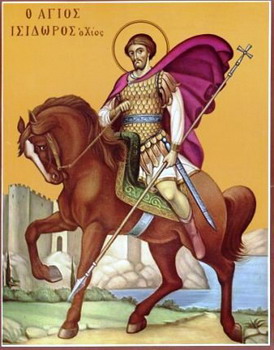 In the reign of the Emperor Decius, this Isidore was taken by force by soldiers from the island of Chios. He had held the Christian faith from his youth, and had spent his life in fasting, prayer and good works. So when, in the army, he declared himself to be a Christian, the commander took him to task for it, and urged him to deny Christ and offer sacrifice to idols. The saint replied: 'Even if you kill my body, you have no power over my soul. I have the true and living God, Jesus Christ, who lives in me and will be with me at my death; and I am in Him and shall remain in Him, and will not cease to confess His holy name while the spirit is in my body.' The commander ordered that they first beat him with iron flails and then cut out his tongue. But, even without his tongue, Isidore was able to speak, and confessed the name of Christ by the Spirit of God. Meanwhile the punishment of God struck the commander, and he suddenly became mute. The mute commander finally gave the signal to behead Isidore. Isidore rejoiced at this sentence and, praising God, went out to the scaffold, where his head was cut off in the year 251. His friend, Ammon, buried his body and, after that, himself suffered and received the wreath of martyrdom. In the reign of the Emperor Decius, this Isidore was taken by force by soldiers from the island of Chios. He had held the Christian faith from his youth, and had spent his life in fasting, prayer and good works. So when, in the army, he declared himself to be a Christian, the commander took him to task for it, and urged him to deny Christ and offer sacrifice to idols. The saint replied: 'Even if you kill my body, you have no power over my soul. I have the true and living God, Jesus Christ, who lives in me and will be with me at my death; and I am in Him and shall remain in Him, and will not cease to confess His holy name while the spirit is in my body.' The commander ordered that they first beat him with iron flails and then cut out his tongue. But, even without his tongue, Isidore was able to speak, and confessed the name of Christ by the Spirit of God. Meanwhile the punishment of God struck the commander, and he suddenly became mute. The mute commander finally gave the signal to behead Isidore. Isidore rejoiced at this sentence and, praising God, went out to the scaffold, where his head was cut off in the year 251. His friend, Ammon, buried his body and, after that, himself suffered and received the wreath of martyrdom.Our Holy Father Serapion the Sindonite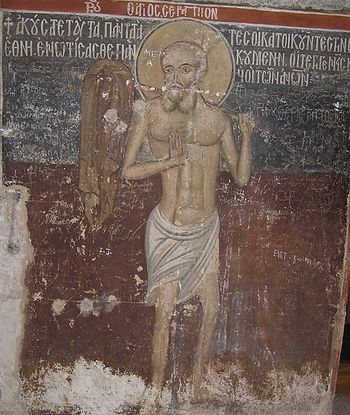 'Sindon' means 'linen cloth', and this saint was called' the Sindonite' because he covered his naked body only with a linen cloth. He carried the Gospels in his hand. Serapion lived like the birds, with no roof and no cares, moving from one place to another. He gave his linen cloth to a poor wretch who was shivering with cold, and himself remained completely naked. When someone asked him: 'Serapion, who made you naked?', he indicated the Gospels and said: 'This!' But, after that, he gave away the Gospels also for the money needed by a man who was being hounded to prison by a creditor for a debt. At one time in Athens, he did not eat for four days, having nothing, and began to cry out with hunger. When the Athenian philosophers asked him what he was shouting about, he replied: 'There were three to whom I was in debt: two have quietened down, but the third is still tormenting me. The first creditor is carnal lust, which has tormented me from my youth; the second is love of money, and the third is the stomach. The first two have left me alone, but the third one still torments me.' The philosophers gave him some gold to buy bread. He went to a baker, bought a single loaf, put down all the gold and went out. He went peacefully to the Lord in old age, in the 5th century. 'Sindon' means 'linen cloth', and this saint was called' the Sindonite' because he covered his naked body only with a linen cloth. He carried the Gospels in his hand. Serapion lived like the birds, with no roof and no cares, moving from one place to another. He gave his linen cloth to a poor wretch who was shivering with cold, and himself remained completely naked. When someone asked him: 'Serapion, who made you naked?', he indicated the Gospels and said: 'This!' But, after that, he gave away the Gospels also for the money needed by a man who was being hounded to prison by a creditor for a debt. At one time in Athens, he did not eat for four days, having nothing, and began to cry out with hunger. When the Athenian philosophers asked him what he was shouting about, he replied: 'There were three to whom I was in debt: two have quietened down, but the third is still tormenting me. The first creditor is carnal lust, which has tormented me from my youth; the second is love of money, and the third is the stomach. The first two have left me alone, but the third one still torments me.' The philosophers gave him some gold to buy bread. He went to a baker, bought a single loaf, put down all the gold and went out. He went peacefully to the Lord in old age, in the 5th century.Blessed Isidore the Fool for Christ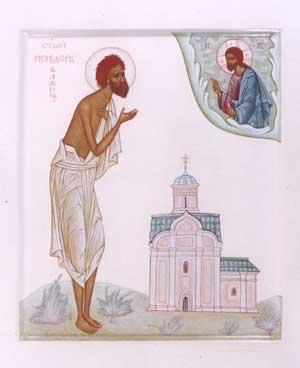 He was of German birth. Going to Rostov from an attraction to the Orthodox faith, he not only became a member of the Orthodox Church but took on himself the strict asceticism of folly for Christ. He lived in rags, spending the day pretending madness and, through this madness, teaching men, and spending the nights in prayer. He spent these nights in a hut outside the town, built in a lonely swamp. Great and mighty wonders were performed by this saint, both during his lifetime and after his death. He appeared to a merchant who had been thrown out of his ship and was drowning. Isidore came to him through the water and led him to the shore. He caused the wine in all the containers to dry up one day , when the servants had driven him from the door of the Prince of Rostov without giving him a single cup of water. When he died in his hut on May 24th, 1484, the whole of Rostov was aware of a fragrant odour. The merchant who had been saved from the sea built a church in the place where the hut had stood. He was of German birth. Going to Rostov from an attraction to the Orthodox faith, he not only became a member of the Orthodox Church but took on himself the strict asceticism of folly for Christ. He lived in rags, spending the day pretending madness and, through this madness, teaching men, and spending the nights in prayer. He spent these nights in a hut outside the town, built in a lonely swamp. Great and mighty wonders were performed by this saint, both during his lifetime and after his death. He appeared to a merchant who had been thrown out of his ship and was drowning. Isidore came to him through the water and led him to the shore. He caused the wine in all the containers to dry up one day , when the servants had driven him from the door of the Prince of Rostov without giving him a single cup of water. When he died in his hut on May 24th, 1484, the whole of Rostov was aware of a fragrant odour. The merchant who had been saved from the sea built a church in the place where the hut had stood.Martyr Maximus, under Decius (250)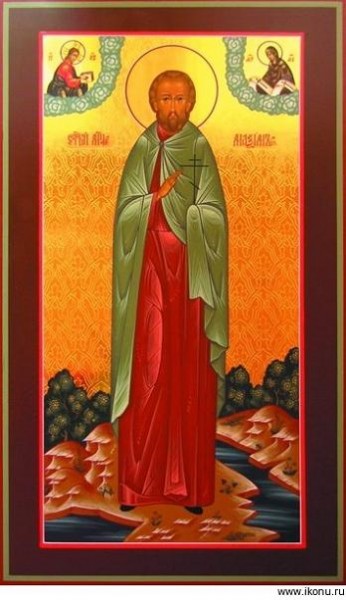 The Holy Martyr Maximos suffered under the emperor Decius (249-251). Maximos was a layman and plied the trade of merchant. He was a pious Christian and he led many pagans to faith in Christ the Saviour, and persuaded them to accept Baptism. One time, when the pagans had gathered for offering to their gods an human sacrifice, Saint Maximos plucked up his courage, and unable to bear the sight of such a spectacle, he rushed at them, loudly denouncing their impiety and error, calling the idols soulless creations of mankind. The frenzied pagans stoned the martyr to death. The Holy Martyr Maximos suffered under the emperor Decius (249-251). Maximos was a layman and plied the trade of merchant. He was a pious Christian and he led many pagans to faith in Christ the Saviour, and persuaded them to accept Baptism. One time, when the pagans had gathered for offering to their gods an human sacrifice, Saint Maximos plucked up his courage, and unable to bear the sight of such a spectacle, he rushed at them, loudly denouncing their impiety and error, calling the idols soulless creations of mankind. The frenzied pagans stoned the martyr to death.Saint Leontios, Patriarch of Jerusalem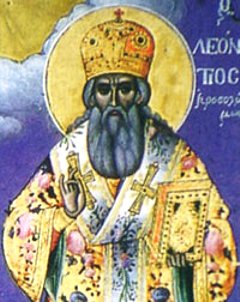 Saint Leontios, Patriarch of Jerusalem, by the account of Saint Gregory Palamas, was Patriarch during the years 1223-1261. His life was similarly described by Theodore, a monk of Constantinople. This Vita was translated in abridged form from the Greek into the Russian language. It was translated a second time more fully by the Monk Nikodemos of the Holy Mountain, who indicates the death of the Patriarch was instead actually in the year 1175. Saint Leontios, Patriarch of Jerusalem, by the account of Saint Gregory Palamas, was Patriarch during the years 1223-1261. His life was similarly described by Theodore, a monk of Constantinople. This Vita was translated in abridged form from the Greek into the Russian language. It was translated a second time more fully by the Monk Nikodemos of the Holy Mountain, who indicates the death of the Patriarch was instead actually in the year 1175.New Martyr Mark of Crete, at Smyrna (1643)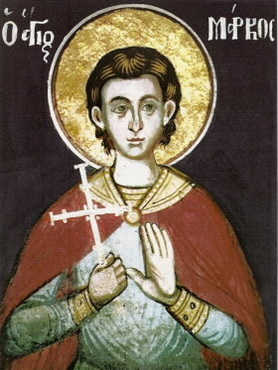 The Holy Martyr Mark of Crete was beheaded by the Turks in the year 1643 for confessing faith in Christ. The Holy Martyr Mark of Crete was beheaded by the Turks in the year 1643 for confessing faith in Christ.New Martyr John-Raiko of Shumena, Bulgaria (1802)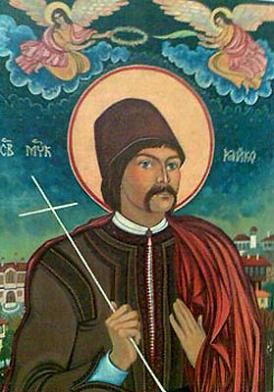 The Holy Martyr John the Bulgarian was martyred by the Turks as a Christian in the year 1802. The Holy Martyr John the Bulgarian was martyred by the Turks as a Christian in the year 1802. Sts. Alexander, Barbarus, and AcolythusMartyred at the Church of Holy Peace by the Sea in Constantinople.
|